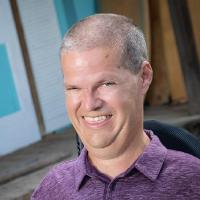00:00:15
Ladies and gentlemen, Dr. Nick Williams.
00:00:26
Please welcome Dr. Williams!
00:00:32
Um, just a quick note about transitions. The good folks at Apple haven't come up with a "calmly soften to silence" option for slides. It just says to stop, which is a bit sad.
00:00:38
My name is Dr. Nic Williams. I am a doctor, and historically, there used to be some good jokes about that.
00:00:47
If you have a good joke about doctors on an airplane, please share. I've never been upgraded on a flight.
00:00:54
So, I have not found many pros to being a doctor. I remember when I started my PhD, I found a webpage warning against pursuing one.
00:01:05
It was a long program taking years of your life, and the advice was to help people avoid it and get real jobs.
00:01:12
However, half the reasons listed were the reasons I was pursuing it myself. I wanted to be called 'Doctor.' But none of those expectations turned out to be true.
00:01:24
The idea of being a doctor is just an interesting topic.
00:01:29
So, without digressing further, I want to introduce you to something I think is really cool: Cloud Foundry.
00:01:41
I originally came from Engine Yard, where we didn't use Cloud Foundry.
00:01:47
However, I secretly thought it was really cool but couldn't talk about it. This is all open source.
00:01:59
Currently, it’s running a Heroku build pack for Ruby, and it automatically picks up the Ruby version from my Gemfile.
00:02:06
It provides all the functionalities you get with Heroku, but the cool part is it's functioning on my Amazon account.
00:02:12
I could do exactly the same with OpenStack, but I only run OpenStack on one machine, which isn't the best way to run it in production.
00:02:30
During my time at Engine Yard, I realized I cared about those who don't have access to cloud hosting services like Heroku.
00:02:42
I started to think about how I could help those individuals in large companies forced to use inadequate technology.
00:02:51
We often talk about helping others, but I want you to think about how to improve my life—especially the future version of me.
00:03:06
I'm 38 and plan to work for a long time because it will keep me alive.
00:03:12
One crucial piece of advice: don't retire; it can be lethal.
00:03:18
I envision working in larger companies with poor technology. While we can create excellent technology, we need to get it into these corporations.
00:03:30
I became very interested in Cloud Foundry so that great tools could be introduced into big organizations.
00:03:39
The idea of Cloud Foundry excites me because, retrospectively, many people have worked in large companies with outdated technology.
00:03:51
People often leave these companies for better technology like Ruby and Heroku or other attractive options.
00:03:58
Getting Cloud Foundry into big organizations is my goal and dream. I work a lot, and the notion of work-life balance seems elusive.
00:04:09
I have children and a wife, and I must always look like I'm giving them my full attention, even when my mind might wander.
00:04:21
I am not necessarily a role model for living a happy and healthy life, but these are important issues I continuously ponder.
00:04:36
This may seem trivial, but I find it essential to provide good tools for those who don't have the ability to choose them.
00:04:45
I love Cloud Foundry because its setup is substantially easier than doing it with Chef or Puppet.
00:04:54
It simplifies everything with an easy interface and build packs, making sharing applications straightforward.
00:05:03
However, I'm particularly invested in how easy it is for someone to actually implement and run Cloud Foundry.
00:05:15
If someone expressed desire to run Cloud Foundry at their company, I'd want them to have a good process for getting started.
00:05:25
It's crucial that the shiny options we access are also accessible to those managing the infrastructure.
00:05:32
This is the logo for Cloud Foundry. It’s owned by Pivotal, which used to be a part of VMware.
00:05:41
Pivotal Labs was established as a new company to sponsor and maintain these projects.
00:05:54
You might have heard of tools like Redis and RabbitMQ, which are Java-based, and Pivotal is one of the owners driving Cloud Foundry.
00:06:04
What's cool is that, unlike OpenStack, which receives contributions from many organizations, Pivotal can control and build products efficiently.
00:06:15
Observing Pivotal's progress with open source projects has been impressive over the past six months.
00:06:25
This is a public website for Cloud Foundry that you might consider using instead of Heroku.
00:06:34
After leaving Engine Yard, I decided to venture into creating a company focused on Cloud Foundry because it seemed like sound business to me.
00:06:46
If you're a Rails developer, you may have felt that job opportunities seem too similar and non-differentiating.
00:07:02
Working in this space could thus provide a distinctive edge and yield a successful career.
00:07:10
Now I have to convince you all to believe in this vision so that it can become a reality.
00:07:20
Please agree with me upfront; it's crucial for my peace of mind as I don't like being wrong.
00:07:29
Many of you have likely used Heroku. Is there anyone who hasn’t? For those who haven’t, it's important for you to know what it offers.
00:07:39
Rather than compare them outright, I prefer to simply state that Cloud Foundry is the private version of Heroku.
00:07:46
Running your own instance is incredibly exciting, allowing you to work directly with your tools.
00:07:54
In the domain of DevOps, automation is a key advantage when it comes to managing applications.
00:08:03
This technology is under active development and shows great promise, making it important to consider it for your tech stack.
00:08:14
Jamie Vanny said that getting into Cloud Foundry is like a 'nerd fest,' which I agree with.
00:08:20
There is incredibly interesting technology, most of it written in Ruby with some components in Go.
00:08:26
Cloud Foundry has a unique model of saving money, which implies interesting propositions for developers.
00:08:33
I’m not discussing a specific clash between Heroku and Cloud Foundry; rather, it’s a presentation of their differing costs.
00:08:40
I've found the pricing at Digital Ocean compelling, though they may not provide a full PaaS experience.
00:08:52
AWS offers significant cost savings if you purchase reserved instances, which can drop to about $150 per container.
00:09:01
Keep in mind that this is not for everyone; if you're satisfied with your current setup, don't worry.
00:09:06
Heroku and other managed services are still fantastic.
00:09:11
However, for those running their own infrastructures, understanding Cloud Foundry becomes crucial.
00:09:19
Cloud Foundry initially wasn't built with Docker in mind, and I got frustrated when I first saw their Warden.
00:09:29
It was promising the potential to isolate apps nicely, just as Docker does now.
00:09:40
As we look at building a PaaS, we can reimagine it using modern container technology.
00:09:54
But after Cloud Foundry embraced containers, they brought the concept of building HA apps.
00:10:01
The reality of a PaaS starts with running processes effectively.
00:10:08
You're going to need a Ruby app—whether it’s Rack or Rails—and you must contain your app.
00:10:20
Container tech from Docker or Warden will help achieve this, and you must decide how to manage resources.
00:10:29
Remember, when Heroku started, they didn't use containers.
00:10:36
Instead, they implemented a more rudimentary way to isolate apps on shared machines, but containers brought them to the next level.
00:10:48
A container allows you to provide dedicated resources to apps, which is a feature we all want.
00:10:55
If you are contemplating building a PaaS, be aware of the challenges involved.
00:11:05
You'll need to understand application collection, scale out effectively, and maintain your processes.
00:11:12
Even system healing is essential; platforms need to be able to restart services when failures occur.
00:11:19
An API will centralize all this management. Command-line tools make it easier to interact with that API.
00:11:29
To enable external access, you must configure traffic management, not letting it bubble away in isolation.
00:11:37
Databases, message buses, and other components make a substantial impact on your architecture.
00:11:44
When managing multiple VMs, you can either collocate services or distribute them based on your available resources.
00:11:54
While managing Cloud Foundry costs can be challenging, co-locating workloads can help save money.
00:12:01
Recently, discussions have arisen around new PaaS solutions like Flynn or Doku.
00:12:11
These projects propose alternative approaches to constructing your own PaaS.
00:12:19
My advice is to prepare in advance and start establishing your infrastructure needs.
00:12:30
Cloud Foundry or similar structures can help improve your application lifecycle management.
00:12:41
I want to share an example of an open-source project, Zipkin, which captures traffic in a microservices architecture.
00:12:54
Despite its elegance, it comes with numerous requirements that complicate deployment.
00:13:03
Perhaps I’m overly critical of corporate open-source projects. I feel they should also provide practical aspects of their solutions.
00:13:14
This disconnection from practical usability extends to projects like Cloud Foundry, which can be intimidating and complex.
00:13:25
However, with Bosch, a tool designed to manage distributed systems, you can successfully deploy complex architectures.
00:13:36
I'll demonstrate Bosch and how to manage and deploy your Cloud Foundry for efficient operation.
00:13:46
The more I worked with Bosch, the clearer it became that it isn’t just for the technically advanced.
00:14:02
We want our tools to be simple and effective. Efficiency is key.
00:14:11
With Bosch, integrating different parts into Cloud Foundry is a breeze.
00:14:21
We want to simplify deployment for those who aren't as familiar with the intricacies.
00:14:31
Utilizing the command line effectively is essential for simplifying the process.
00:14:39
With Bosch, you can implement various components without heavy investment in time.
00:14:49
Optimizing the deployment process with templates simplifies how systems evolve over time.
00:15:01
Using preconstructed templates can save a considerable amount of effort.
00:15:08
I struggle to emphasize enough that Bosch is quite similar to Chef in managing your infrastructure.
00:15:19
Thus, if you are keen on building out your systems, automating this layer should be a priority.
00:15:29
A widespread issue is the lack of community-driven solutions for infrastructure orchestration.
00:15:39
There are immense benefits to employing Bosch, and I encountered significant challenges while at Engine Yard.
00:15:50
Stack control becomes critical when dealing with updates and scaling in production environments.
00:16:01
Through Bosch, I believe we can overcome limitations placed on scaling.
00:16:09
The significant matter of upgrading technologies without breaking existing systems is a key advance.
00:16:18
All these elements ensure smooth updates, enabling systems to evolve.
00:16:25
These processes facilitate maintenance and support over time, extending the system's life cycle.
00:16:38
The Unix principle of doing one thing well may not entirely align with Bosch's expansive aim.
00:16:46
While making progress on functions like building images and running deployments, it proves complex.
00:16:55
Bosch aims to tackle all aspects of system management effectively.
00:17:06
Running Cloud Foundry may initially seem complicated, but the diversity of tools facilitates its usability.
00:17:15
We should strive for newer, cutting-edge solutions that successfully manage production systems.
00:17:23
Maintaining legacy systems doesn't mean getting stuck; progress and innovation remain vital.
00:17:31
Setting up Cloud Foundry provides a pathway towards streamlined project management and bolstered efficiency.
00:17:43
I would love to see everybody utilize these resources toward a successful approach.
00:17:50
Building solid, reliable systems is built upon the foundation of effective collaboration with the community.
00:17:59
Investing time into building out this system is crucial and undoubtedly worthwhile.
00:18:07
In conclusion, good technology should always be accessible to everyone.
00:18:16
I appreciate your time, and I urge you to explore these options further.
00:18:26
Thank you for your attention!
00:18:47
Thank you!








































